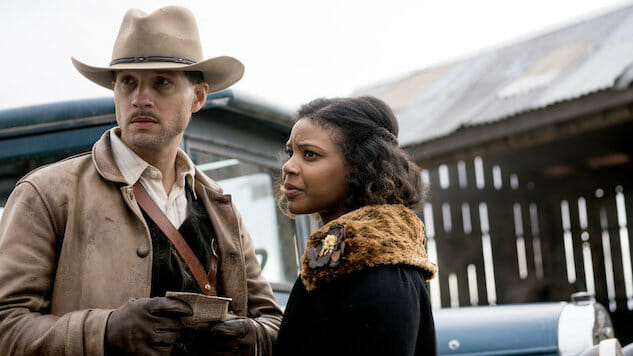What Makes a Hit? Why Godless Got the Attention Damnation Deserved
Photo: Chris Large/USA Network
“The farmers’ plight is just… sad. It’s difficult enough for people to live through an actual depression, without being subjected to its printed equivalent.” —Damnation’s corrupt and ambivalent newspaper editor, describing the key obstacle of the very show he’s on
The first season of USA Network’s strike vs. strikebreaker Depression-era shoot-em-up, Damnation, concluded last week. You probably had no idea. I knew I was going to be writing about it, and even I had no idea. It just sort of… happened. Look, there’s a lot of television on these days. How is anyone supposed to keep track?
I don’t mean to be flip: Obviously, I am supposed to keep track, but in general, there is a lot of television these days. And it’s not just that there is a lot of television, full stop—there is a lot of good television. There is so much good television that, even as a critic, entire series—good series—will come and go without managing to make an impression. Somehow Survivor’s Remorse reached four seasons before I knew it existed; Lovesick and Red Oaks each hit three. The Bold Type is custom-made for my tastes and airs on the only network to host appointment television for me for the last five years (RIP Mona Vanderwaal), and even then I didn’t know it existed until the week after it premiered.
That said, I would bet whole nickels I could ask any number of non-television friends if they’d ever heard of any of those shows, and they’d all get at least one yes.
I know from trying that Damnation, which premiered two weeks before Netflix’s tonally similar cowboy justice joint Godless did and had the critical darling Mr. Robot as a programming partner, elicits no yeses. “You heard about Damnation?” I spent the last several weeks asking anyone who’d listen. “What’s that?” they’d say. “How about Godless?” I’d ask next. “Oh, yeah, the one on Netflix?” they’d nod.
Or if you prefer harder data: Godless has a Metacritic score of 75, with 25 critics reviewing throughout the month following its Nov. 22 release. Damnation, meanwhile, has a Metacritic score of 57, with only 15 critics reviewing, none later than its Nov. 7 release.
On its face, this makes zero sense. Boiled down to their most basic, both of these shows are cinematically sweeping, muted American (Mid)West grimdark period pieces about deep-seated and variably complex grudges between two men with a half-secret familial bond and the tough-as-bootleather women who endure and occasionally partner with and love them. Both feature so much shooting and blood, in that way that is meant to be entertainingly, edgily horrifying (you know, rather than just legitimately horrifying). Even without the fact that Godless only promised to focus on the most subversively progressive lady-centric angle of its story before falling back on its good man vs. bad man patriarchal Western tropes—down even to the twang-for-twang framing of its Deadwood dopplegänger opening credits—while Damnation actually followed through on its promise to interrogate the corruption of capitalism and racism and the gulf of messy morality between what is good for the individual and what is good for society—its own credits, notably, are restrained to a singular and thematic blooming of the title in the background of the climactic moment of each episode’s opening scene—the two shows should have found similarly fertile cultural ground to take root in.
So why did Godless strike a chord in the collective critical consciousness (Paste reviewed it twice), while Damnation fell flat?
Well, I have some theories. Some really dull, prosaic theories. Namely, that name recognition tops ambition, streaming is the new prestige, and a Western in an all-women mining town sells better than striking Iowan farm workers.
That’s it.
-

-

-

-

-

-

-

-

-

-

-

-

-

-

-

-

-

-

-

-

-

-

-

-

-

-

-

-

-

-

-

-

-

-

-

-

-

-

-

-








































